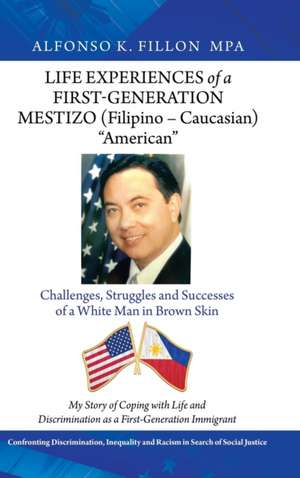Life Experiences of a First-Generation Mestizo (Filipino - Caucasian) American: Challenges, Struggles and Successes of a White Man in Brown Skin
Autor Alfonso K. Fillon Mpaen Limba Engleză Hardback – 18 aug 2020
Preț: 174.26 lei
Nou
Puncte Express: 261
Preț estimativ în valută:
33.34€ • 36.33$ • 28.10£
33.34€ • 36.33$ • 28.10£
Carte tipărită la comandă
Livrare economică 24 aprilie-08 mai
Preluare comenzi: 021 569.72.76
Specificații
ISBN-13: 9781728369617
ISBN-10: 1728369614
Pagini: 180
Dimensiuni: 152 x 229 x 11 mm
Greutate: 0.41 kg
Editura: Authorhouse
ISBN-10: 1728369614
Pagini: 180
Dimensiuni: 152 x 229 x 11 mm
Greutate: 0.41 kg
Editura: Authorhouse
Notă biografică
In this memoir Mr. Alfonso Fillon shares memories from throughout his 70+ years of life about how his biracial bicultural Filipino-Caucasian ethnicity caused others to behave towards him, how he responded toward them and how these interactions influenced his decisions and shaped who he is. They are memories of an American with an Asian father and a mother of Northern European ancestry. Filipinos, borrowing from Spanish, call such mixed-race people Mestizos. While the Caucasian-Filipino Mestizo-American with a blonde blue-eyed mother might recognize her or his own internal qualities inherited or learned from the Caucasian parent, white supremacists only see the superficial darkness of skin, hair and eyes and aim their hate accordingly. Thus, being a Filipino-Caucasian American frequently encountering white racists was painful, generating anger, fear, and insecurity, feelings that he desires to share with the reader. By imposing their definitions on him, the racists were constantly reminding him that he could never be a "real American." Mr. Fillon shares stories showing how some racially prejudiced Caucasian Americans tried to persecute him and his family but he also makes it clear that he bears no grudges against those perpetrators. Many of Mr. Fillon's Caucasian friends whom he has told of those experiences felt badly for him or even apologized for the behavior of their fellow Caucasians. He appreciates the empathy but is quick to point out that no apology is necessary and that harboring hostility towards past perpetrators would only hurt himself. The author is a proud to be an American and U. S. Military Veteran. He tears up when recalling how his father crossed the world's greatest ocean to arrive in, become a citizen of, and raise his family in his beloved America. About the Author Narrative Provided by: Richard Tenaza, PhD, Professor Emeritus University of the Pacific Stockton California
